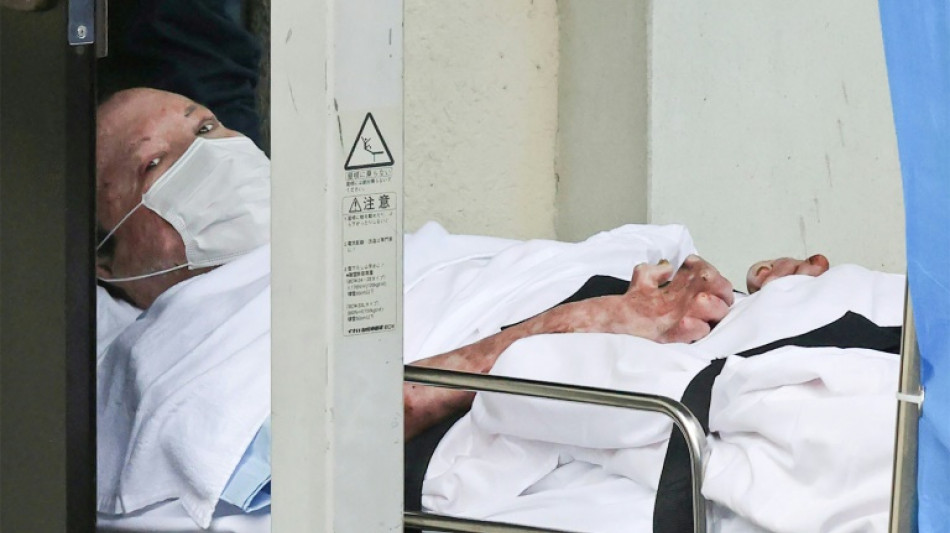
| RBGPF | 1.33% | 61 | $ | |
| SCS | -1.33% | 13.54 | $ | |
| RELX | 0.51% | 46.81 | $ | |
| RYCEF | 0.44% | 6.8 | $ | |
| NGG | -0.68% | 62.83 | $ | |
| CMSC | -0.65% | 24.57 | $ | |
| RIO | -1.53% | 62.03 | $ | |
| GSK | -0.38% | 34.02 | $ | |
| BTI | 1.01% | 37.71 | $ | |
| BP | -1.24% | 28.96 | $ | |
| VOD | -0.56% | 8.86 | $ | |
| BCE | -1.46% | 26.63 | $ | |
| BCC | -2.76% | 148.41 | $ | |
| CMSD | -0.61% | 24.43 | $ | |
| JRI | -0.98% | 13.24 | $ | |
| AZN | -0.06% | 66.36 | $ |

Japanese man sentenced to death in anime arson trial
A Japanese court on Thursday sentenced to death the perpetrator of a 2019 arson attack on an animation studio that killed 36 people, local media reported.
The blaze that ripped through the studios of Kyoto Animation four-and-a-half years ago was Japan's deadliest crime in decades, stunning the anime industry and its fans around the world.
Shinji Aoba, now 45, broke into the building, spread gasoline around the ground floor, lit it and shouted "drop dead" on the morning of July 18, 2019, survivors said.
Many of those killed were young, including a 21-year-old woman.
A number of victims were found on a spiral stairwell leading to the roof, suggesting they were overcome as they desperately tried to escape.
"There was a person who jumped from the second floor... but we couldn't rush to help because the fire was so strong," one woman told local media at the time.
"It was like I was looking at hell."
More than 30 others were injured, with firefighters calling the incident "unprecedented" and saying that rescuing people trapped inside was "extremely difficult".
- 'I went too far' -
Aoba, who was arrested near the scene, faces five charges including murder, attempted murder and arson, and prosecutors are seeking capital punishment in the high-profile trial.
His lawyers entered a plea of not guilty, saying he "did not have the capacity to distinguish between good and bad and to stop committing the crime due to a mental disorder".
But on Thursday, the judge ruled Aoba was "neither insane nor suffering diminished mental capacity at the time of the crime", NHK reported.
Inside the courtroom packed with family members of the victims, one person cried and covered their eyes as the judge spoke, the broadcaster reported.
Later the court handed down a sentence of capital punishment, local media reported.
"I didn't think so many people would die, and now I think I went too far," Aoba told the Kyoto District Court when the trial opened in September, reports said at the time.
Aoba had a "delusion" that the studio known by its fans as KyoAni stole his ideas, prosecutors said, a claim the company has denied.
Aoba suffered burns in the fire that covered 90 percent of his body and he reportedly needed 12 operations.
He regained consciousness weeks later and was said to have sobbed with relief after undergoing a procedure that restored his ability to speak.
- Death row -
Japan is one of the few developed countries with capital punishment, typically meted out in murder cases with more than one victim, and polls show public support is high.
Criticism from rights groups though is rife, with inmates often informed of their imminent execution on the morning of the day they are to be hanged.
The last execution was in 2022 and, as of December, 107 people were on death row.
The highest-profile executions in recent years were in 2018, when Japan hanged 13 people -- including the guru of a doomsday cult -- responsible for the 1995 sarin attacks on Tokyo's subway.
- 'Won't come back' -
Founded in 1981 by a husband and wife, KyoAni is a household name for anime fans, responsible for popular TV series including "The Melancholy of Haruhi Suzumiya" and "K-ON!"
After the attack, there was shock and grief in Japan and worldwide, with Apple CEO Tim Cook tweeting that KyoAni's artists "spread joy all over the world and across generations with their masterpieces".
A US animation company raised $2.4 million via crowdfunding to help the firm get back on its feet.
For families of the deceased, the pain of their loss remains excruciating to this day.
"I should have told her not to go to work that morning," the mother of 49-year-old Naomi Ishida told the Mainichi Shimbun daily this week.
"Even if he gets the death penalty, Naomi and others won't come back. I feel empty," said the woman, whose husband died a month before the first hearing.
burs-stu/cwl
O.M.Jacobs--JdB



